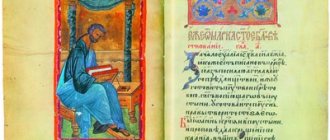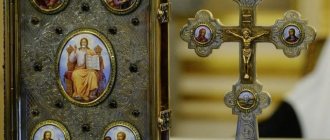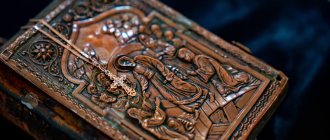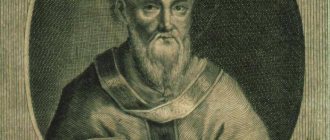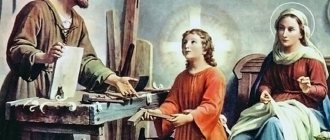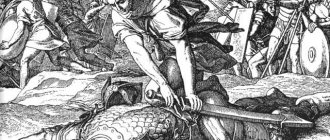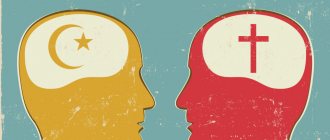Saint John Chrysostom is one of the greatest fathers of the Universal Church. He left us a huge literary and liturgical heritage. In his explanation of the Holy Scriptures, the saint showed how the Bible can become a true teacher of a person. Explaining the holy books, he often made digressions on contemporary social and moral topics, constantly emphasizing the connection of what was said in the Old and New Testaments with the spiritual life and actions of a Christian. This is what made his biblical interpretations so instructive both for his contemporaries and for all subsequent generations. The first book contains 44 conversations-interpretations of St. John Chrysostom on the Gospel of Matthew.
Saint John Chrysostom Commentary on the Gospel of Matthew. In two books. Book I
The name of the Archbishop of Constantinople, who occupied the primary see of the Eastern Ecumenical Church - John Chrysostom (344/345-407), has long become a household name. His works, conversations, teachings, and letters are read with the same genuine interest as during the saint’s earthly life, and in the choice of theological topics, preaching, and methods of interpreting Scripture, he has been imitated for many centuries. The richness, strength, and ease of language in expressing thoughts and feelings earned the famous speaker and talented wordsmith recognition, enshrined in the honorary addition to his name - Chrysostom.
The legacy of the ecumenical teacher, which was included in the Holy Tradition of the Orthodox Church, conveying the revealed truth, is very extensive, but the interpretations of the New Testament (presented to the reader’s attention) belong to the best among his creations, as was noted already in antiquity. Chrysostom always preached the Gospel as the law of life, for him the Good News of Christ, Crucified and Risen is not an object of curiosity, perceived by memory, but the Word of God, living, active, which, according to the Apostle Paul, penetrates to the division of soul and spirit, joints and brains, and judges thoughts and intentions of the heart (Heb. 4:12). Conversations on the Gospels of Matthew and John, together with other interpretations, constitute the fruit of his twelve years of preaching activity in Antioch, when twice a week, and sometimes every day, he addressed the people, shaking the hearts of his listeners. Most of Chrysostom’s works are edited notes from stenographers, so his words exude the indescribable freshness of a living conversation between a shepherd and his flock.
As a representative of the Antiochian theological school, he treated Scripture as history, and not as a parable, balancing the literal-logical level of meaning of the text with the moral and theological-symbolic. Chrysostom's approach to the New Testament anticipated criticism of the Holy Scriptures in our time, as, for example, in the question of the four Gospels (in Discourse I of the Commentaries on St. Matthew the Evangelist).
Limiting himself to brief information about the writer of the holy book and the circumstances of its writing, the saint further followed the general course of the Gospel events, the movement of the Apostle’s thoughts, penetrating into the depths of the Word of God. Saint John always pointed to the Holy Scriptures as the main and obligatory source of religious teaching and moral edification and called on everyone to diligently listen and read the Bible, saying: “This is the food of the soul, this is its protection; on the contrary, not listening to Scripture is hunger and destruction for the soul.”
From the editor
Chapter first
Matthew 1:1. Book of kinship.
Why did not Saint Matthew say “vision” or “word”, like the prophets, for they thus wrote: “The vision that Isaiah saw” (Isaiah 1:1) or “The word that came ... to Isaiah” (Isaiah 2) , 1)? Do you want to know why? Because the prophets spoke to the hard-hearted and rebellious, and therefore they said that this was a Divine vision and the word of God, so that the people would fear and not despise what they said. Matthew spoke to the faithful, well-meaning, and obedient, and therefore did not first say anything like the prophets. I also have something else to say: what the prophets saw, they saw with their minds, contemplating it through the Holy Spirit; that's why they called it a vision. Matthew did not mentally see Christ and contemplate Him, but morally remained with Him and sensually listened to Him, contemplating Him in the flesh; therefore he did not say: “the vision that I saw,” or “contemplation,” but said: “The Book of Kinship.”
Jesus
The name “Jesus” is not Greek, but Hebrew, and translated means “Savior,” for the Jews use the word “yao” to talk about salvation.
Christ
Kings and high priests were called Christs (“Christ” in Greek means “anointed one”), for they were anointed with holy oil poured out from a horn, which was placed on their heads. The Lord is called Christ both as a King, for He reigned against sin, and as a High Priest, for He offered Himself as a sacrifice for us. He was anointed with the true oil, the Holy Spirit, and anointed above others, for who else had the Spirit like the Lord? The grace of the Holy Spirit acted in the saints, but in Christ it was not the grace of the Holy Spirit that acted, but Christ Himself, together with the Spirit of Consubstantiality with Him, performed miracles.
Son of David
After Matthew said “Jesus,” he added “Son of David” so that you would not think that he was talking about another Jesus, for there was another famous Jesus, the leader of the Jews after Moses. But this one was called the son of Nun, and not the son of David. He lived many generations before David and was not from the tribe of Judah, from which David came, but from another.
Son of Abraham.
Why did Matthew put David before Abraham? Because David was more famous; he lived later than Abraham and was a glorious king. Of the kings, he was the first to please God and received a promise from God that Christ would arise from his seed, which is why everyone called Christ the Son of David. And David actually retained the image of Christ in himself: just as he reigned in the place of Saul, rejected by God and hated by God, so Christ came in the flesh and reigned over us after Adam lost the kingdom and power that he had over all living things and over demons .
Matthew 1:2. Abraham gave birth to Isaac;
The evangelist begins his genealogy with Abraham because he was the father of the Jews, and because he was the first to receive the promise that “through his seed all nations will be blessed.” So, it is fitting to begin the genealogy of Christ from him, for Christ is the seed of Abraham, in whom all of us who were pagans and were formerly under the curse were blessed. Abraham in translation means “father of tongues”, and Isaac means “joy”, “laughter”. The Evangelist does not mention the illegitimate children of Abraham, for example, Ishmael and others, because the Jews did not descend from them, but from Isaac.
Isaac gave birth to Jacob; Jacob begat Judah and his brothers;
You see that Matthew mentioned Judas and his brothers because the twelve tribes came from them.
Matthew 1:3. Judah fathered Perez and Zerah by Tamar;
Judah gave Tamar in marriage to Er, one of his sons; when this one died childless, he married her to Ainan, who was also his son. When this one also lost his life for his shame, Judas no longer united her in marriage with anyone. But she, strongly desiring to have children from Abraham’s seed, put aside the clothes of widowhood, took on the form of a harlot, mixed with her father-in-law and conceived two twin children from him. When the time came for the birth, the first of the sons showed his hand from his spoon, as if he would be the first to be born. The midwife immediately marked the child's hand with a red thread so that he could recognize who would be born first. But the child carried his hand into the womb, and first another baby was born, and then the one who first showed his hand. Therefore, the one born first was called Pharez, which means “break,” because he disturbed the natural order, and the one who carried away the hand was called Zara. This story points to some mystery. Just as Zara first showed his hand, and then drew her away again, so did life in Christ: it was revealed in the saints who lived before the law and circumcision, for all of them were not justified by keeping the law and commandments, but by the life of the gospel. Look at Abraham, who for the sake of God left his father and home and renounced his nature. Look at Job, Melchizedek. But when the law came, such a life was hidden, but just as after the birth of Perez, later Zerah came out of the womb again, so after the giving of the law, the life of the gospel later shone forth, sealed with a red thread, that is, the blood of Christ. The Evangelist mentioned these two babies because their birth meant something mysterious. In addition, although Tamar, apparently, does not deserve praise for mixing with her father-in-law, the evangelist also mentioned her in order to show that Christ, who accepted everything for our sake, also accepted such ancestors. More precisely: in order to sanctify them by the fact that He Himself was born of them, for He did not come “to call the righteous, but sinners.”
Perez begat Hezrom; Hezrom begat Aram;
Matthew 1:4. Aram gave birth to Abminadab; Amminadab begat Nahshon; Nahshon begat Salmon;
Matthew 1:5. Salmon fathered Boaz by Rahab;
Some think that Rahab is the Rahab the harlot who received Joshua’s spies: she saved them and was saved herself. Matthew mentioned her in order to show that just as she was a harlot, so was the whole assembly of the Gentiles, for they committed fornication in their deeds. But those of the pagans who accepted the spies of Jesus, that is, the apostles, and believed in their words, these were all saved.
Boaz fathered Obed by Ruth;
This Ruth was a foreigner; however, she was married to Boaz. So the pagan church, being a foreigner and outside the covenants, forgot its people and the veneration of idols, and its father the devil, and the Son of God took her as a wife.
Obed begat Jesse;
Matthew 1:6. Jesse begat David king; David the king begot Solomon from Uriah;
And Matthew mentions Uriah’s wife here for the purpose of showing that one should not be ashamed of one’s ancestors, but most of all try to glorify them with one’s virtue, and that everyone is pleasing to God, even if they were descended from a harlot, if only they have virtue.
Matthew 1:7. Solomon begat Rehoboam; Rehoboam gave birth to Abijah; Abijah begat Asa;
Matthew 1:8. Asa begat Jehoshaphat; Jehoshaphat begat Joram; Jehoram begat Uzziah;
Matthew 1:9. Uzziah begat Jotham; Jotham begat Ahaz; Ahaz begat Hezekiah;
Matthew 1:10. Hezekiah begat Manasseh; Manasseh begat Amon; Amon gave birth to Josiah;
Matthew 1:11. Josiah begat Joachim; Joachim gave birth to Jehoiachin and his brothers before moving to Babylon.
The Babylonian migration is the name given to the captivity that the Jews later suffered when they were taken all together to Babylon. The Babylonians fought with them at other times, but they embittered them more moderately, and then they completely resettled them from their fatherland.
Matthew 1:12. After moving to Babylon, Jeconiah gave birth to Salathiel; Shealtiel begat Zerubbabel;
Matthew 1:13. Zerubbabel begat Abihu; Abihu begat Eliakim; Eliakim begat Azor;
Matthew 1:14. Azor begat Zadok; Zadok gave birth to Achim; Achim begat Eliud;
Matthew 1:15. Elihu begat Eleazar; Eleazar begat Matthan; Matthan gave birth to Jacob;
Matthew 1:16. Jacob begat Joseph, the husband of Mary, from whom was born Jesus, who is called Christ.
Why is the genealogy of Joseph given here, and not of the Virgin Mary? What part did Joseph have in that seedless birth? Here Joseph was not the true father of Christ, so that the genealogy of Christ could be traced from Joseph. So, listen: indeed, Joseph did not have any participation in the birth of Christ, and therefore had to give the genealogy of the Mother of God; but since there was a law not to conduct genealogy through the female line (Num. 36:6), Matthew did not give the genealogy of the Virgin. Moreover, having given the genealogy of Joseph, he also gave her genealogy, for the law was not to take wives either from another tribe, or from another clan or surname, but from the same tribe and clan. Since there was such a law, it is clear that if the genealogy of Joseph is given, then the genealogy of the Mother of God is also given, for the Mother of God was from the same tribe and the same family; if not, then how could she be betrothed to him? Thus, the evangelist complied with the law, which forbade genealogy through the female line, but, nevertheless, gave the genealogy of the Virgin Mary, giving the genealogy of Joseph. He called him Mary’s husband according to the general custom, for we have the custom of calling the betrothed the husband of the betrothed, although the marriage has not yet been consummated.
Matthew 1:17. So all the generations from Abraham to David are fourteen generations; and from David to the deportation to Babylon, fourteen generations; and from the migration to Babylon to Christ there are fourteen generations.
Matthew divided the clans into three parts to show the Jews that whether they were under the government of judges, as they were before David, or under the government of kings, as they were before the exile, or under the government of high priests, as they were before the coming of Christ, they did not receive any benefit from this in relation to virtue and needed a true judge, king and high priest, who is Christ. For when the kings ceased, according to the prophecy of Jacob, Christ came. But how is it possible that from the Babylonian migration to Christ there are fourteen generations, when there are only thirteen of them? If the genealogy could include a woman, then we would include Mary and complete the number. But woman is not included in the genealogy. How can this be resolved? Some say that Matthew counted the migration as a face.
Matthew 1:18. The birth of Jesus Christ was like this: after the betrothal of His Mother Mary to Joseph,
Why did God allow Mary to be betrothed, and in general, why did He give people reason to suspect that Joseph knew Her? So that She has a protector in misfortunes. For he cared for Her during the flight into Egypt and saved Her. At the same time, She was betrothed in order to hide Her from the devil. The devil, having heard that the Virgin would be pregnant, would watch Her. So, in order for the liar to be deceived, the Ever-Virgin becomes engaged to Joseph. The marriage was only in appearance, but in reality it did not exist.
Before they were united, it turned out that she was pregnant with the Holy Spirit.
The word “combine” here means intercourse. Before they were united, Mary conceived, which is why the amazed evangelist exclaims: “it turned out,” as if talking about something extraordinary.
Matthew 1:19. Joseph, Her husband, being righteous and not wanting to make Her public, wanted to secretly let Her go.
How was Joseph righteous? While the law commands the adulteress to be exposed, that is, to be reported and punished, he intended to conceal the sin and break the law. The question is resolved primarily in the sense that already through this very thing Joseph was righteous. He did not want to be harsh, but, loving mankind in his great kindness, he shows himself above the law and lives above the commandments of the law. Then, Joseph himself knew that Mary conceived from the Holy Spirit, and therefore did not want to expose and punish the one who conceived from the Holy Spirit, and not from an adulterer. For look what the evangelist says: “it turned out that she was with child from the Holy Spirit.” For whom did it “turn out”? For Joseph, that is, he learned that Mary conceived by the Holy Spirit. Therefore, he wanted to secretly let her go, as if he did not dare to have as a wife the one who had been awarded such great grace.
Matthew 1:20. But when he thought this, behold, an angel of the Lord appeared to him in a dream, saying:
When the righteous man hesitated, an angel appeared, teaching him what he should do. It appears to him in a dream because Joseph had strong faith. The angel spoke to the shepherds as rude in reality, but to Joseph as righteous and faithful, in a dream. How could he not believe when the angel taught him what he had reasoned with himself and had not told anyone? While he was thinking but not telling anyone, an angel appeared to him. Of course, Joseph believed that this was from God, for only God knows the unspeakable.
Joseph, son of David!
He called him the son of David, reminding him of the prophecy that Christ would come from the seed of David. Saying this, the angel urged Joseph not to believe, but to think about David, who had received the promise regarding Christ.
don't be afraid to accept
This shows that Joseph was afraid to have Mary, so as not to offend God by patronizing the adulteress. Or in other words: “do not be afraid,” that is, be afraid to touch her, as if she conceived from the Holy Spirit, but “do not be afraid to receive,” that is, to have her in your home. For in his mind and thought Joseph had already let Mary go.
Mary, your wife,
This is the angel saying: “You may think that she is an adulteress. I tell you that she is your wife,” that is, she was not corrupted by anyone, but your bride.
for that which is born in Her is of the Holy Spirit;
For she is not only far from illicit intercourse, but she also conceived in some divine way, so that you should rejoice the more.
Matthew 1:21. will give birth to a Son,
So that someone does not say: “But why should I believe you that what is born is of the Spirit?”, the angel speaks of the future, namely, that the Virgin will give birth to a Son. “If in this case I turn out to be right, then it is clear that this is also true – “from the Holy Spirit.” He didn’t say “he will give birth to you,” but simply “he will give birth.” For Mary did not give birth for him, but for the whole universe, and grace did not appear for him alone, but it was poured out on everyone.
and you shall call His name Jesus,
You will name, of course, as the father and as the patron of the Virgin. For Joseph, having learned that conception is from the Spirit, no longer thought about letting the Virgin go helpless. And you will help Maria in everything.
for He will save His people from their sins.
Here it is interpreted what the word “Jesus” means, namely the Savior, “for He,” it is said, “will save His people” - not only the Jewish people, but also the pagan ones, who strive to believe and become His people. What will it save you from? Is it because of the war? No, but from “their sins.” From this it is clear that the One who will be born is God, for it is characteristic of God alone to forgive sins.
Matthew 1:22. And all this happened, that what was spoken by the Lord through the prophet might be fulfilled, who says:
Do not think that this recently became pleasing to God - long ago, from the beginning. You, Joseph, as you who were brought up in the law and know the prophets, think about what the Lord said. He did not say “what was spoken by Isaiah,” but “by the Lord,” for it was not man who spoke, but God through the mouth of man, so the prophecy is completely reliable.
Matthew 1:23. Behold, the Virgin will receive in her womb,
The Jews say that the prophet has not a “virgin”, but a “young woman”. They must be told that in the language of Holy Scripture, a young woman and a virgin are one and the same, for it calls an uncorrupted woman a young woman. Then, if it were not a virgin who gave birth, how could this be a sign and a miracle? For listen to Isaiah, who says that “for this reason the Lord Himself will give you a sign” (Is. 7:14), and immediately adds “behold, Virgin” and further. Therefore, if the virgin had not given birth, there would have been no sign. So, the Jews, planning evil, distort the Scripture and instead of “virgin” they put “young woman”. But whether it is a “young woman” or a “virgin”, in any case, one who is about to give birth should be considered a virgin for this to be a miracle.
and she will give birth to a Son, and they will call His name Immanuel, which means: God is with us.
The Jews say: why is He not called Immanuel, but Jesus Christ? To this it must be said that the prophet does not say “you will name,” but “they will name,” that is, the very deeds will show that He is God, although He lives with us. Divine Scripture gives names from deeds, such as, for example: “call his name Mager-shelal-hashbaz”* (Is. 8:3), but where and who is called by that name? Since, simultaneously with the birth of the Lord, there was plunder and captivity, and wandering (idolatry) ceased, that is why it is said that He was called so, having received the name from His work.
Matthew 1:24. Rising from sleep, Joseph did as the Angel of the Lord commanded him,
Look at the awakened soul, how quickly it becomes convinced.
and took his wife,
Matthew constantly calls Mary the wife of Joseph, driving away evil suspicion and teaching that she was not the wife of anyone else, but him.
Matthew 1:25. and did not know her when she finally gave birth
that is, he never mixed with her, for the word “how” (“dondezhe”) here means not that he did not know her before birth, but after that he knew her, but that he never knew her at all. This is the peculiarity of the language of Scripture; Thus, the corvid did not return to the ark, “until the water dried up from the earth” (Genesis 8:7), but he did not return even after that; or again: “I am with you always, even to the end of the age” (Matthew 28:20), but after the end will it not be? How? Then even more so. Similarly, here the words: “how she finally... gave birth” should be understood in the sense that Joseph did not know her either before or after her birth. For how would Joseph have touched this saint when he knew well her ineffable birth?
His firstborn son,
She calls Him the firstborn not because she allegedly gave birth to another son, but simply because He was the first born and the only one: Christ is both “firstborn,” as the first born, and “only begotten,” as having no second brother.
and he called His name Jesus.
Joseph shows his obedience here too, because he did what the angel told him.
Conversation I
Why was the Holy Scripture given? – When and how the Old Law and the New Testament were given. – Why did Matthew call his work the Gospel? – Why was the Gospel written by four people? – Minor differences in the narratives of the evangelists serve as proof of their truth. – In the main and essential things, the Gospels are completely in agreement. – Differences in the purposes of writing the four Gospels. – The agreement of the evangelists is confirmed by the affinity of each part of their writings with the whole, as well as by the acceptance of their preaching by the entire universe. – The truth of the Gospel preaching is proven by its superiority over the teaching of philosophers and its acceptability for people of all ranks and ages. – Erroneous opinion about the simplicity and ease of explanation of the Gospel of Matthew. – Indication of the perplexities presented at the very beginning of the Gospel. – An admonition to listeners to be attentive to the explanation, to diligently visit the temple instead of spectacles, to study what is related to heavenly life and to observe silence and silence in the temple.
